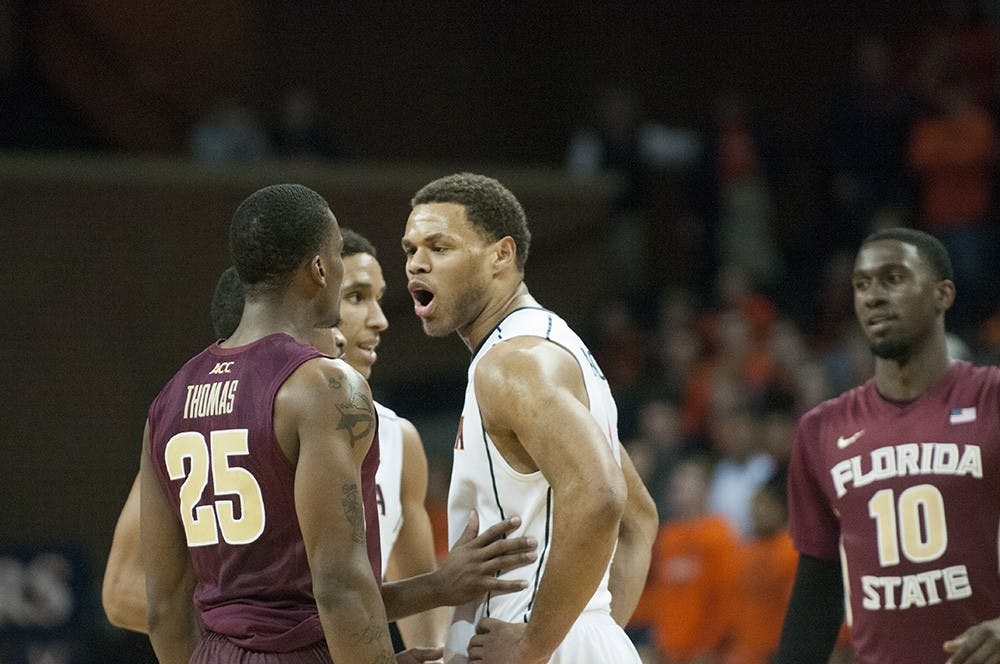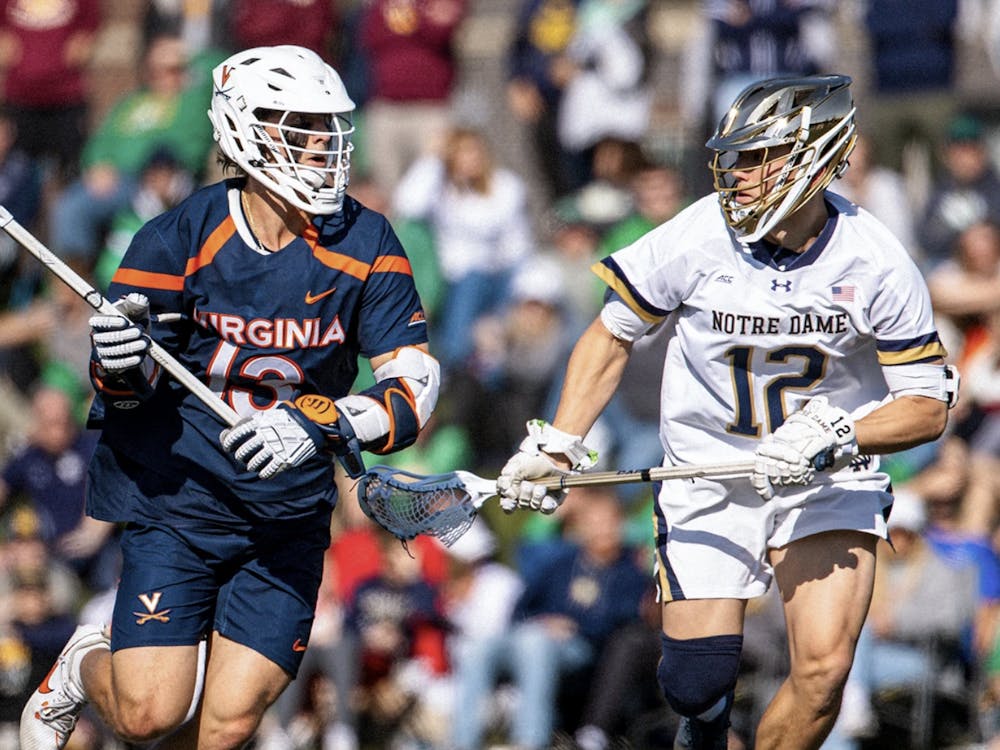When you consider eight players were ejected in the opening two seconds of Saturday’s Flames-Canucks game, a pair of ejections for Virginia’s men’s basketball team doesn’t sound too bad in comparison.
The ruckus started when Justin Anderson flushed a two-handed alley-oop from Malcolm Brogdon to take a 14-point lead with 18 seconds to play. Anderson was quickly assessed a technical by referee Jamie Luckie for hanging on the rim, and a few Florida State players didn’t take kindly to the exclamation point with which Anderson punctuated the game.
There was a slight difference in the shot and game clocks, so Virginia could not run the game out without taking a shot. Anderson was merely playing the game full speed — as were Florida State’s defenders — and took a very high-percentage shot as the shot clock wound down.
Counterpoint: through the eyes of the Seminoles, a team the Cavaliers readily dispatched twice by double digits in the span of two weeks, Anderson’s alley-oop could very easily be viewed as showboating. And as for the shot clock argument, it showed 13 seconds left when Anderson finished his dunk — it certainly didn’t appear Virginia was trying very hard to run the clock down.
Neither side is entirely innocent in the matter. If the Seminoles wanted the Cavaliers to merely run out the clock, maybe they shouldn’t have played such aggressive defense in the closing seconds. Or if they just didn’t want Anderson to dunk on them, maybe they should have played defense a little more aggressively.
I’m never one for grandstanding with a game in-hand, but Florida State didn’t leave Virginia many options. Would sinking a mid-range jumper have been less offensive?
For the amount of time Anderson was on the rim, it didn’t seem a technical was warranted, but it was just long enough to fall into the gray area. Apparently Anderson took a little too long to return to Earth from his space odyssey for Luckie’s liking. The referee aroused my suspicion, however, with how quickly he T’d Anderson up, almost as if he was waiting for an opportunity to score a little camera time.
While Florida State senior guard Ian Miller shot a pair of free throws resulting from the technical, Cavaliers and Seminoles exchanged words on the court. While it looked as if Seminole sophomore guard Aaron Thomas may have been the most vocal of the participants, seniors Joe Harris and Okaro White appeared to separate their teams, effectively mitigating the tension.
But as freshman point guard London Perrantes walked back towards the Virginia bench, he and White seemed to graze each other. While it was virtually impossible to tell what was said, Perrantes turned and appeared to initiate the ensuing — albeit brief — quarrel with a shove, which White reciprocated. Referees and coaches quickly gained control of the situation as Perrantes and White were issued offsetting technicals.
Luckie subsequently ejected Teven Jones and Darion Atkins from the game for leaving the bench area during the scrum. Though ejected, both are eligible to play Monday night against North Carolina.
Many pointed to Luckie as the architect of the entire squabble — I’m starting to run low on synonyms — believing that if he hadn’t issued a technical to Anderson, the whole debacle would have been avoided. I’m not sure I agree.
While the teams were in close proximity as Miller attempted the foul shots, there were still almost 20 seconds to play. What was said was likely still going to be said, technical or not. It was Anderson’s dunk, rather than the technical, that drew Florida State’s ire. It is entirely feasible that a Seminole could have still goaded Perrantes with trash talk had Luckie kept his whistle holstered and let the game run its course.
That Perrantes was bothered by Florida State’s talk while Harris and others were not is mainly a result of experience, according to teammates. For a team that is usually cool-headed, the veterans will likely use this as a teaching opportunity for the freshman.
“Me and Joe have been in the program for a while,” Brogdon said. “We realize that when we beat teams bad, there’s going to be some anger that results from that. [We] aren’t really caught up in that… We’re just glad to get the win.”
It is admirable that Atkins and Jones raced onto the court to defend their teammate. However, both know better than to leave the bench during an altercation and risk suspension, particularly with the Tarheels visiting Charlottesville just two days later. With Atkins playing increasingly sparse minutes, he would do well to avoid any sort of unwanted attention.
The duo didn’t make physical contact with anyone, but that didn’t stop the NBA from suspending Amare Stoudemire and Boris Diaw during the 2007 Playoffs, who stepped off the bench in response to teammate Steve Nash being violently hip-checked into the scorer’s table. Stranger things happen regularly in the twisted realm of the NCAA.
In all, emotions were high among both teams, and the referees and coaches both did admirable jobs at reigning in the potential chaos at the end of the game. The only truly disheartening occurrence was another minor skirmish during the postgame handshake line. That 20-year-olds couldn’t put aside their on-court differences to shake hands in a display of sportsmanship is somewhat understandable given how the game ended, but no less disappointing.
“That doesn’t take away from the quality of play,” Virginia coach Tony Bennett said. “Things happen in the heat of battle… I don’t think we were trying to disrespect anybody.
“I told my guys they are lovers not fighters. The best way to respond is to play as well as you can.”







